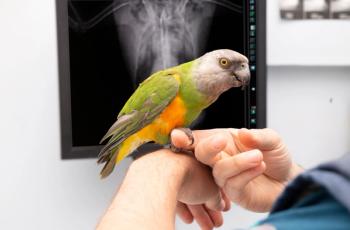
AI literacy for veterinarians: Why staying informed matters
Do you have AI literacy? If not, Christopher Pinard, DVM, DVSc, DACVIM (Oncology), and Adam Christman, DVM, MBA, are here to educate you on the power of AI in veterinary medicine.
On this week's episode of The Vet Blast Podcast, presented by dvm360, our host Adam Christman, DVM, MBA, welcomes Christopher Pinard, DVM, DVSc, DACVIM (Oncology), to chat about all things artificial intelligence (AI) in veterinary medicine. Throughout the episode, Pinard and Christman explore the benefits of AI in the veterinary industry, including how it can revolutionize veterinary practices for patients and staff, Pinard's journey into the world of AI, and more on his life as the CEO and cofounder of ANI.ML Health Inc.
Below is a partial transcript, edited lightly for clarity.
Adam Christman, DVM, MBA: So, you're a veterinary oncologist; tell us and the listeners a little bit about your background and how you got into...veterinary oncology, and then how that translated a little bit over into the AI space.
Christopher Pinard, DVM, DVSc, DACVIM (Oncology): I'm a [professor at the] University of Guelph, Ontario Veterinary College—born and bred right from the beginning. I actually did my undergrad there, my DVM there, and then I went to Colorado State University for a clinical trial specialty internship and did a lot of work with the team there, working with some of the human hospitals as well, looking at a lot of translational oncology, which was super fun.
Honestly, what got me into oncology in the first place is really my wife and I. Our own dog developed cancer, and that really piqued my interest during my second year of veterinary school... I've been full tilt ever since. So I went back to the University of Guelph for my residency [and] worked with Dr Sam Hawker as my adviser, and Dr Paul Woods. We...all worked on this idea of immuno-oncology, or how the immune system interacts with tumors.
Then I had this great opportunity after meeting a few colleagues in the area, here in Toronto, which has really become a big AI hot spot, at least in the Canadian realm, at Sunnybrook Research Institute, which is a human hospital and a subsidiary of the University of Toronto. I got to do a postdoctoral fellowship looking at AI and women with breast cancer, and we wrote a paper on some translational approaches back into the veterinary space and vice versa. So again, how veterinary medicine can be this innovative space to iterate [and] develop not only drugs but [also] now AI technologies and translate back to humans, and how we're going to be able to do that in the future. That really started everything in terms of my entire research program, as well as the projects that we're working on. And then now the company that we've started as well, which is heavily focused on research as well in the AI space, the veterinary AI space specifically.
Newsletter
From exam room tips to practice management insights, get trusted veterinary news delivered straight to your inbox—subscribe to dvm360.




